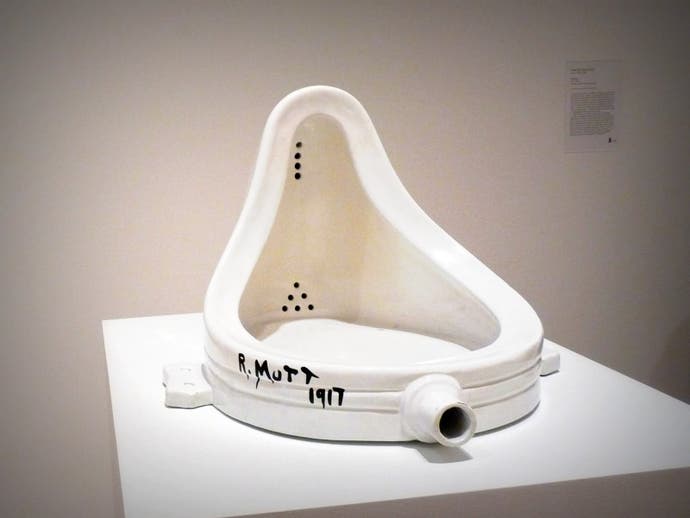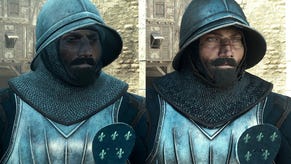Who framed Roger Ebert?
From the archive: Press A to Art.
Every week we bring you a feature from our archive for you to discover, or simply to read again. This Sunday we present Richard Stanton's Who framed Roger Ebert, a detailed dissection of a question that's lingered around video games for an age. A sidenote - Life Itself, a documentary on the life of Ebert, is out in the US now, and is coming to the UK later this year.
Are videogames art? What's your reaction to that question? For me it's always a weary groan of resignation, followed by skipping the rest of the article. Perhaps that's arrogance, because for a sizeable chunk of the gaming audience it is a very big deal indeed, and a topic that won't go away. When there's a flashpoint, such as a couple of articles by the film critic Roger Ebert, no one could miss the storm. But whether games are art is not a question that needs answering, and these pieces are a useful tool for explaining why.
I'm not going to spend this article arguing with Ebert, but it's worth briefly reminding ourselves of what was said and done. The first salvo came after a review of the execrable movie version of Doom. In response to a comment from a reader, Ebert said "As long as there is a great movie unseen or a great book unread, I will continue to be unable to find the time to play video games."
Pretty cranky stuff, but each to their own. By March 2010 Kelee Santiago of thatgamecompany was delivering a talk at Ted in direct response to Ebert: 'Stop the Debate: Video games are art, so what's next?' Santiago showed Waco Resurrection, Braid, and Flower while offering reasons for why games like these should be considered as art.

Ebert's most flammable statements came in his reply to this talk: "Perhaps it is foolish of me to say 'never,' because never, as Rick Wakeman informs us, is a long, long time. Let me just say that no video gamer now living will survive long enough to experience the medium as an art form."
And by the way, when games get close to 'art' they cease to be games: "Santiago might cite a immersive game without points or rules, but I would say then it ceases to be a game and becomes a representation of a story, a novel, a play, dance, a film. Those are things you cannot win; you can only experience them." At this point it should be clear that Ebert doesn't know anything about games and is pretty much making up points or rules as he goes along.
His final piece was in July 2010: 'Okay, kids, play on my lawn'. "There are many, many things I believe many members of our society don't 'get,' but I don't think they're too old or too young to 'get' them, only differently evolved." If you don't get the things Ebert does, you're 'differently evolved'. Despite that, "I had to be prepared to agree that gamers can have an experience that, for them, is Art. I don't know what they can learn about another human being that way, no matter how much they learn about Human Nature."
The idea that 'art' now depends on learning about another human being is tossed in to keep games out, but the concept is not precise - it's another arbitrary line in the sand, another hoop to jump through after which there will be another. The argument is circular, resting on assumptions about shared values and the existence of art with a capital A that seem positively quaint. It's bunk - Ebert doesn't know about games, which is fine, and there this should have ended.
Instead, everyone had a reaction: the Guardian was the coolest head in the crowd; Cracked took it head-on; and every popular specialist site from 1Up to Gamasutra addressed it in their own style. There are many hundreds more examples; Twitter at the time was swamped with it, and a quick google found a blog about it from as recently as last month. Nearly every response includes examples of games that the authors believe deserve recognition as art.
Responses to Ebert were everywhere. People found the topic irresistible - Ebert's two blog posts have around 6,600 comments total at the time of writing. Perhaps the fullest was Professor Brian Moriarty's talk at GDC 2011 'An Apology for Roger Ebert'. It's an interesting and witty take, and fully aware of how swampy an issue 'art' is - but despite this, falls into a nasty trap extremely common among the responses. It does down games. Moriarty's talk posits that games may one day be art, but that there are no games yet that fit the bill. His reasoning comes down to a distinction between mass culture (what games are now) and high art (what they may one day achieve) - in this talk, the terms are 'Kitsch' and 'Sublime Art':

"Kitsch is fundamentally standard, and when standards change, it becomes first irrelevant, then corny, and finally the subject of nostalgia. Sublime art is either always relevant, or not at all. It is never the subject of nostalgia, but often the subject of discovery."
These definitions make so many assumptions they mean nothing. Whose and what standards? Who defines relevance, and in relation to whom? Trends are different everywhere, they come and go and no single creator or medium is independent of them. You may as well say "sublime art is either always here, or there."
This is what high art versus mass culture always comes down to, an indefinable quality that the former possesses which is discernible only to a few. This mystical knowledge confers an unquestioned authority, and is 'profound', 'transcendent', 'sacred' and other such absolutes. In Moriarty's case, "Sublime art is the still evocation of the inexpressible." Or to put it another way - I don't know much about art, but I know what I like.
None of this should be news in the 21st century - the idea of art as something that can be defined objectively began to crumble almost 100 years ago when Marcel Duchamp exhibited a urinal titled 'Fountain'. My favourite example of this is an exhibition held in 1958 by Yves Klein where the Parisian gallery was left entirely empty. Not because I like the idea of attending, but because it's fun watching defenders of art fit it into their schema - clearly, Klein's exhibition is a special type of nothing.
I'm not here to bash modern art - I love all this stuff. But it's important to distinguish our appreciation of any work from a term that is meaningless. Art is a word that denotes exclusivity, but in the current day its meaning can only ever be inclusive. What is art? Art is what any single person considers to be art. There is no such thing as an objective definition, because all that anyone can ever truly know of something is their own experience. When the only possible judgements are subjective, a belief in the existence of a category of things that are 'art' is absurd.
Yet the term still has power. The history of art when we're talking of literature or music or painting is an invented one - those works deemed by this or that critic to be worthy of exalted status. The canon in any medium is the product of remarkably few minds. I think this is why games writers were drawn to Ebert's remarks. It is often a navel-gazing profession, and one whose practitioners agonise over the question of their own importance.
People want to feel special, like their impressions and understanding of a work somehow mean more. Not only does this make the traditionally weighty topic of art appealing, but as a subject it binds criticism into a reassuring loop of self-aggrandisement. The only reason Ebert's remarks acquired any traction whatsoever is because he is seen as an embodiment of taste - a Real Critic who knows about Real Art.

But writers aren't the only culprits here. That old fox Ebert saw our glowing weak spot a mile off. "Why aren't gamers content to play their games and simply enjoy themselves? They have my blessing, not that they care. Do they require validation? In defending their gaming against parents, spouses, children, partners, co-workers or other critics, do they want to be able to look up from the screen and explain, 'I'm studying a great form of art?' Then let them say it, if it makes them happy."
This is it. In arguing for 'games as art' we betray a desire for approval - for the wise words and nodding head of an arbiter. Everyone knows several people, young and old, who don't get games and regard them as children's amusements. I know many more than that. So the thought of describing them as art is comforting, it's authoritative, and a salve to the nagging feeling you're wasting your time. Don Quixote tilts at the windmills, and the windmills tilt back. No one breaks the spell.
We're at the forefront of the only medium in history in which the defining characteristic is interactivity. Is that not enough? I never feel like I'm wasting my time playing a game. Roger Ebert doesn't play videogames and doesn't know anything about them - so why did his argument become a focal point, taken seriously enough to be the subject of so many talks, comments, and even articles like this? The fact is that we framed Roger Ebert, contextualising his words with a jabber of conferences, blogs, and click-throughs. Yet the problem was never his opinion, or indeed any other ad hominem attack on videogames.
The problem is that in engaging with the question we put art on a pedestal - and 'art' just doesn't exist. It's a confidence trick, a way of putting things down. No critic can quite pin art down, but plenty will assure you it is a very grand thing, and they have the refined sensibilities to identify it. Who is the greater fool? The next time someone questions games, remember Yves Klein and his exhibition of thin air. There's never been a more perfect image of art, and just how empty defining it is.









